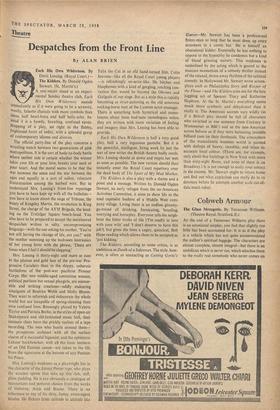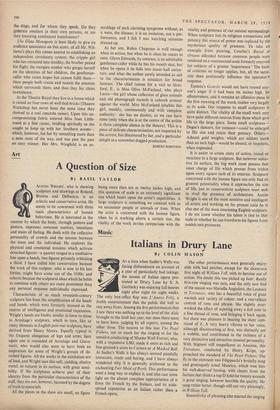Cobweb Armour
The Glass Menagerie. By Tennessee Williams. (Theatre Royal, Stratford, E.) AT the end of a Tennessee Williams play there is an emotional surplus, you feel that slightly too little has been accounted for. It is as if the play is a vehicle which has not quite accommodated the author's spiritual luggage. The characters are almost complete, almost integral—but there is an umbilicus which is never cut, which attaches them to the really real somebody who never comes on the stage, and for whom they speak. Do they generate emotion in their own persons, or are they receiving continuous transfusions?
2 he Glass Menagerie is least likely to give an audience uneasiness on this score; of all Mr. Wil- liams's plays this comes nearest to establishing an independent circulatory system; the cripple girl who has retreated into timidity, the brother poised for flight, the vampire mother who gorges herself on the identities of her children, the gentleman- caller who raises hopes but cannot fulfil them— these people both create and sustain the emotion which surrounds them, and thus they lay claim to existence.
At the Theatre Royal they live in a house which is raised on four rows of well-laid bricks (Theatre Workshop has never been the same since they showed us a real concrete mixer). Upon this un- compromising fabric entered Miss Joan Little- wood at a fine canter, bridling spiritedly as she sought to keep up with her Southern accent— which, however, led her by something more than a nose most of the way, and was past the post an easy winner. Her Mrs. Wingfield is an as- semblage of such alarming symptoms without, as it were, the disease; it is an imitation, not a per- formance, and I felt I was watching someone dressed up.
As her son, Robin Chapman is well enough when in action, but when he is silent he ceases to exist. Glynn Edwards, by contrast, is an admirable gentleman-caller while he has his mouth shut, but when he opens it he falls into music-hall carica- ture, and what the author surely intended as salt to the characterisation is mistaken for broad humour. The chief reason for a visit to Strat- ford, E., is Miss Olive McFarland, who plays Laura—the girl whose collection of glass animals and old phonograph records is cobweb armour against the world. Miss McFarland inhabits this girl, steadily, continuously and with complete authority : she has no doubts, so we can have none (only when she is at the centre of the action is there complete silence in the theatre). This is a piece of delicate characterisation, not imported by the actress, but discovered by her, and a particular delight in a somewhat dogged production.
ROBERT ROBINSON











































 Previous page
Previous page